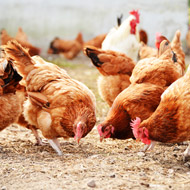Study shows potential of avian influenza to infect humans

Avian influenza viruses isolated from Pakistan are able to escape vaccine immunity and adapt to infect humans.
Avian influenza viruses isolated from Pakistan are able to escape vaccine immunity and adapt to infect humans, according to new research. This could lead to reduced vaccine efficiency and the possibility of human outbreaks.
The study led by The Pirbright Institute found that small changes to a surface protein of the H9N2 influenza A virus (haemagglutinin), enables the mutated virus to enter human cells.
In most cases, influenza viruses that infect humans and chickens use different host cell receptors in the early attachment stage.
“In this study, we demonstrated the mutant can bind to human-type cell receptors, but its preference for avian-like receptors remains,” explained Professor Munir Iqbal, head of the Avian Influenza group at Pirbright.
“H9N2 viruses cause moderate illness and death rates in domestic poultry and do not cause severe disease in humans, but the capability of an H9N2 avian influenza virus to bind to human-like receptors raises concern for potential human transmission.”
Researchers are now working to ascertain how this mutant H9N2 avian influenza A virus could generate a mutation that hits the right balance whilst retaining its ability to bind to human-like receptors.
This information will allow better screening of circulating avian influenza viruses for traits that may allow them to infect humans, providing early warning to their pandemic potential.
The study, Association of Increased Receptor-Binding Avidity of Influenza A(H9N2) Viruses with Escape from Antibody-Based Immunity and Enhanced Zoonotic Potential, is published in Emerging Infectious Diseases.



 The Animal and Plant Health Agency (APHA) has updated its online reporting service for dead wild birds.
The Animal and Plant Health Agency (APHA) has updated its online reporting service for dead wild birds.